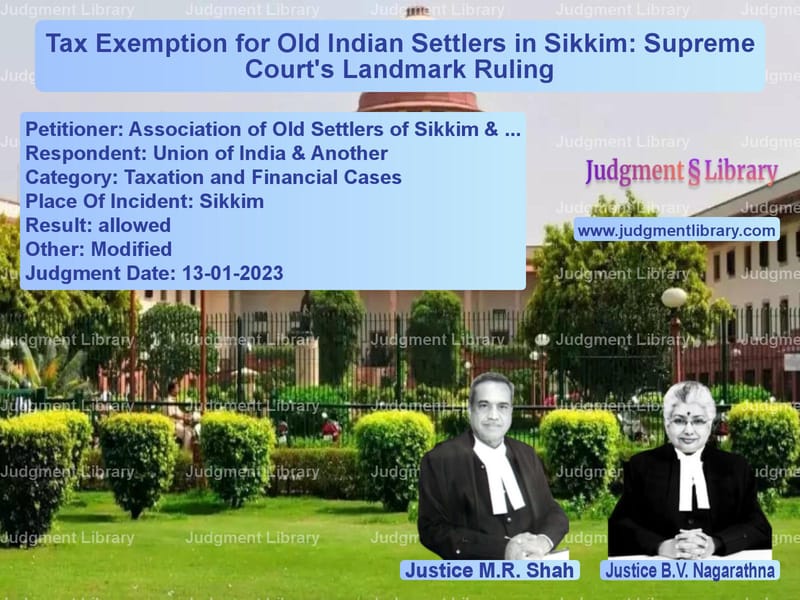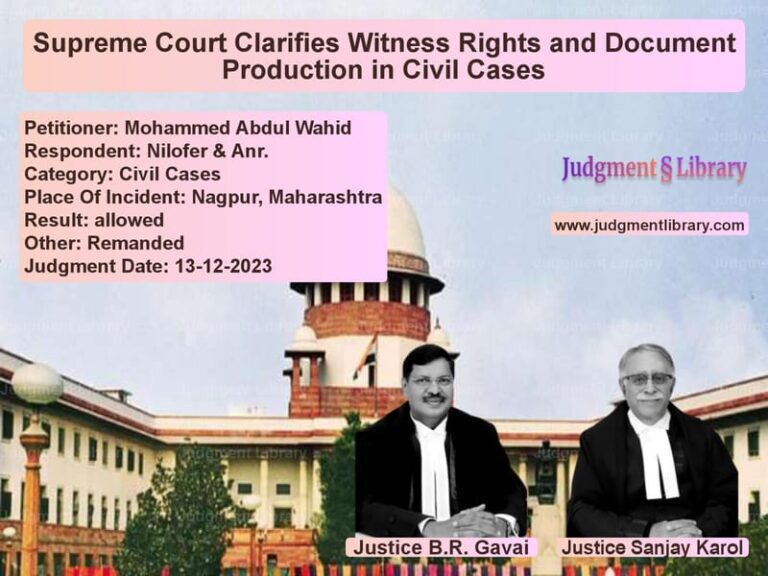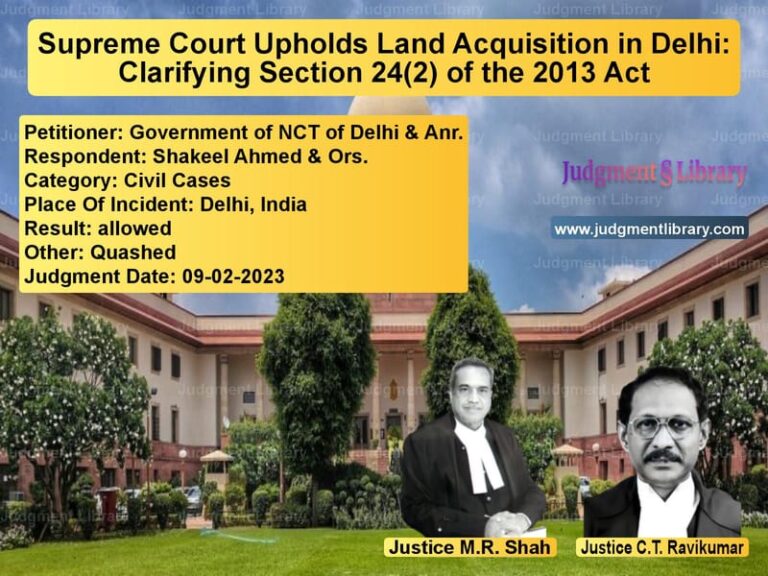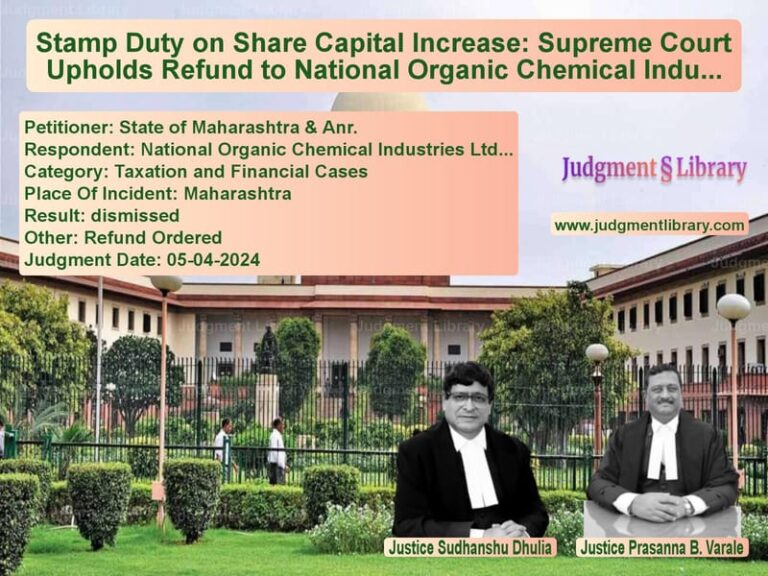Tax Exemption for Old Indian Settlers in Sikkim: Supreme Court’s Landmark Ruling
The Supreme Court of India has recently ruled on the case of Association of Old Settlers of Sikkim & Others vs. Union of India & Another. This landmark judgment has far-reaching implications on the taxation rights of old Indian settlers in Sikkim and addresses gender-based discrimination in tax exemptions under the Income Tax Act, 1961.
The case was primarily focused on the constitutional validity of Section 10(26AAA) of the Income Tax Act, 1961, which grants tax exemptions to ‘Sikkimese’ individuals but excludes old Indian settlers who had been residing in Sikkim before its merger with India in 1975. Another major challenge was against the proviso that denied tax exemption to Sikkimese women who married a non-Sikkimese man after April 1, 2008.
The petitioners contended that such exclusions were arbitrary, violated constitutional rights, and were discriminatory against women. The Supreme Court’s ruling in this case not only extends tax exemption benefits to a previously excluded group but also reinforces the principle of gender equality under the Constitution.
Background of the Case
Sikkim was a princely state before it became a part of India on April 26, 1975. Following the merger, tax laws were gradually extended to Sikkim, leading to concerns regarding income tax exemptions for Sikkimese individuals. In 2008, the Indian government introduced Section 10(26AAA), which provided tax exemptions to ‘Sikkimese’ individuals as per the Sikkim Subjects Register of 1961.
The petitioners, comprising old Indian settlers and Sikkimese women, challenged this classification, arguing that:
- Old Indian settlers, who had been residing in Sikkim for decades before its merger with India, were unfairly excluded from the tax exemption.
- Sikkimese women who married non-Sikkimese men after April 1, 2008, were discriminated against under the law.
- The classification violated their fundamental rights under Articles 14 (Right to Equality), 15 (Prohibition of Discrimination), and 21 (Right to Life and Personal Liberty) of the Constitution.
Arguments by the Petitioners
The petitioners presented the following arguments:
- The exclusion of old Indian settlers was arbitrary and unfair, as they had been permanent residents of Sikkim before 1975 and contributed to its economy.
- Many old Indian settlers were included in voter lists and other government records but were still denied tax exemptions because they were not listed in the Sikkim Subjects Register of 1961.
- Tax exemption was granted to other groups without a reasonable basis, leading to unequal treatment.
- The proviso that denied tax benefits to Sikkimese women who married non-Sikkimese men after 2008 was discriminatory on the grounds of gender.
- A woman’s taxation status should not be affected by whom she chooses to marry.
Arguments by the Respondents
The Union of India defended the provision on the following grounds:
- The tax exemption was meant to protect the special status of Sikkim and was limited to individuals classified as ‘Sikkimese’ under the Sikkim Subjects Register of 1961.
- Extending the tax benefit to all settlers before 1975 would dilute the original intent of the law.
- The proviso regarding Sikkimese women was based on established local customary practices.
Supreme Court’s Observations
- “The exclusion of old Indian settlers who had permanently settled in Sikkim before 1975 from the definition of ‘Sikkimese’ is arbitrary, discriminatory, and violative of Article 14.”
- “Merely because their names were not recorded in the Sikkim Subjects Register due to their decision to retain Indian citizenship, it does not mean they should be denied the benefits given to other residents.”
- “A classification that exempts one group from taxation while burdening another without a rational basis is unconstitutional.”
- “The proviso that denies tax exemption to Sikkimese women who marry a non-Sikkimese after April 1, 2008, is based on gender and violates Articles 14 and 15.”
- “A woman’s identity should not be determined solely based on marriage, and the provision effectively penalizes women for choosing whom to marry.”
Legal Precedents Considered
- Indra Sawhney v. Union of India (1992): Held that classifications based on historical injustices must be reasonable and cannot arbitrarily exclude certain groups.
- Anuj Garg v. Hotel Association of India (2008): Stated that gender-based classifications that reinforce stereotypes are unconstitutional.
- Navtej Singh Johar v. Union of India (2018): Reinforced the principle that laws must be inclusive and should not exclude people based on discriminatory classifications.
Final Judgment
The Supreme Court ruled in favor of the petitioners and made the following decisions:
- The exclusion of old Indian settlers from the definition of ‘Sikkimese’ for tax exemption under Section 10(26AAA) was unconstitutional.
- The proviso that denied tax exemption to Sikkimese women who married a non-Sikkimese after April 1, 2008, was struck down as discriminatory.
- The Union of India was directed to amend the Income Tax Act to include old Indian settlers who had been residing in Sikkim before April 26, 1975.
- The decision ensured that Sikkimese women were not denied tax benefits based on their marital choices.
Implications of the Judgment
This judgment has significant implications:
- It corrects a historical wrong by granting tax exemptions to old Indian settlers who were unfairly excluded.
- It strengthens gender equality in tax laws by ensuring that women are not penalized based on whom they marry.
- It sets a precedent for future cases concerning tax exemptions and the rights of historically marginalized communities.
- It reaffirms the principle that constitutional rights cannot be denied based on outdated classifications.
Conclusion
The Supreme Court’s judgment in this case is a significant victory for old Indian settlers in Sikkim and Sikkimese women. By striking down arbitrary exclusions in tax exemption laws, the Court has upheld the principles of equality and fairness enshrined in the Constitution of India. The ruling ensures that taxation laws remain just and do not discriminate based on historical classifications or gender. It also establishes an important precedent for how laws should be interpreted to align with the fundamental rights of citizens.
Petitioner Name: Association of Old Settlers of Sikkim & Others.Respondent Name: Union of India & Another.Judgment By: Justice M.R. Shah, Justice B.V. Nagarathna.Place Of Incident: Sikkim.Judgment Date: 13-01-2023.
Don’t miss out on the full details! Download the complete judgment in PDF format below and gain valuable insights instantly!
Download Judgment: association-of-old-s-vs-union-of-india-&-ano-supreme-court-of-india-judgment-dated-13-01-2023.pdf
Directly Download Judgment: Directly download this Judgment
See all petitions in Income Tax Disputes
See all petitions in Tax Refund Disputes
See all petitions in Judgment by Mukeshkumar Rasikbhai Shah
See all petitions in Judgment by B.V. Nagarathna
See all petitions in allowed
See all petitions in Modified
See all petitions in supreme court of India judgments January 2023
See all petitions in 2023 judgments
See all posts in Taxation and Financial Cases Category
See all allowed petitions in Taxation and Financial Cases Category
See all Dismissed petitions in Taxation and Financial Cases Category
See all partially allowed petitions in Taxation and Financial Cases Category







